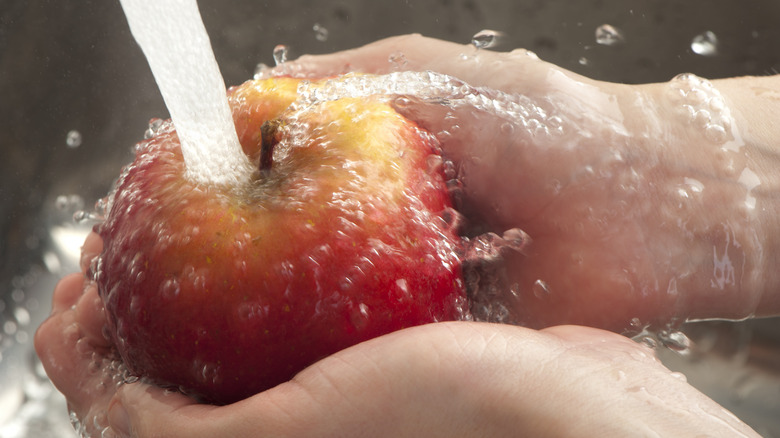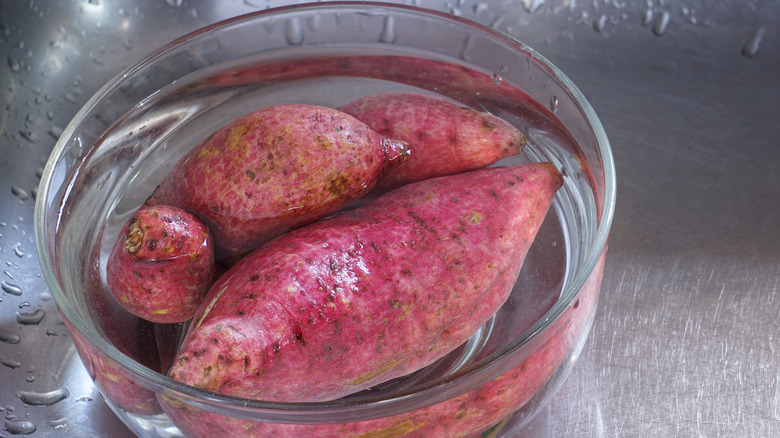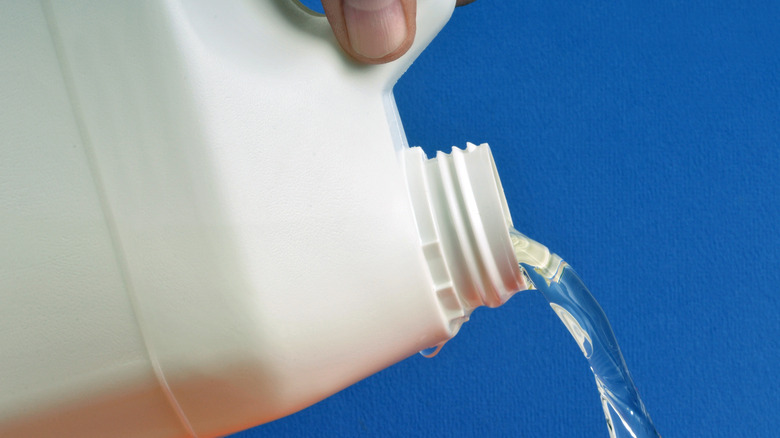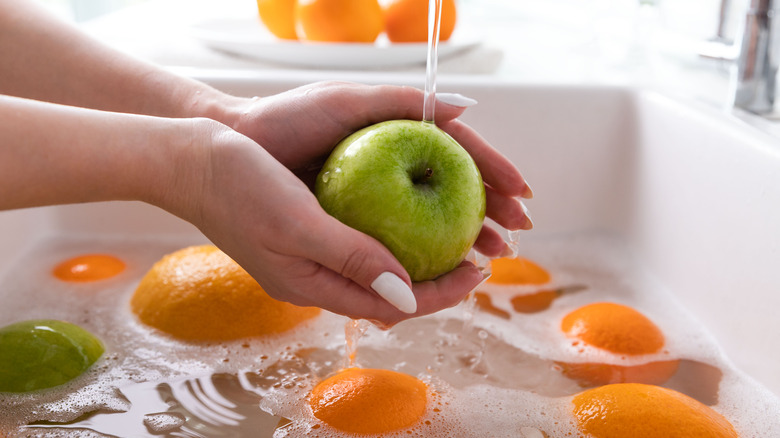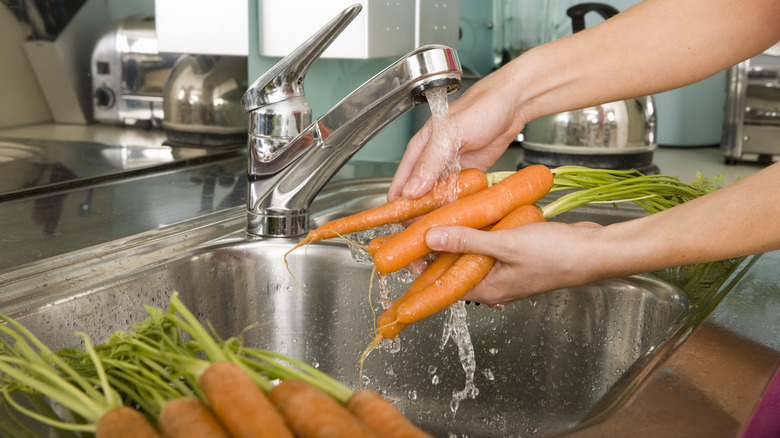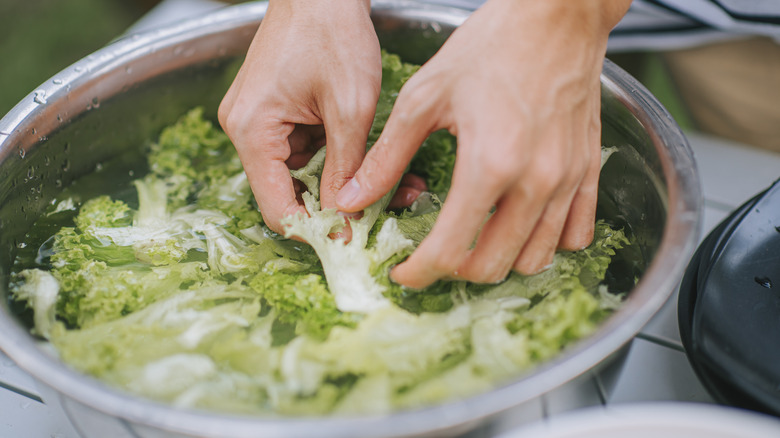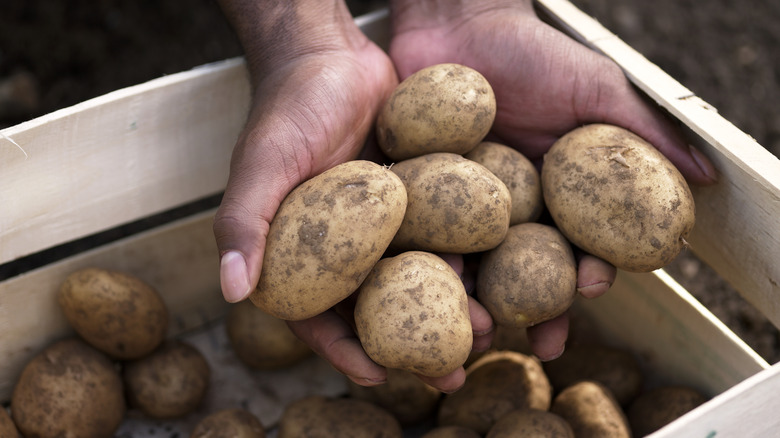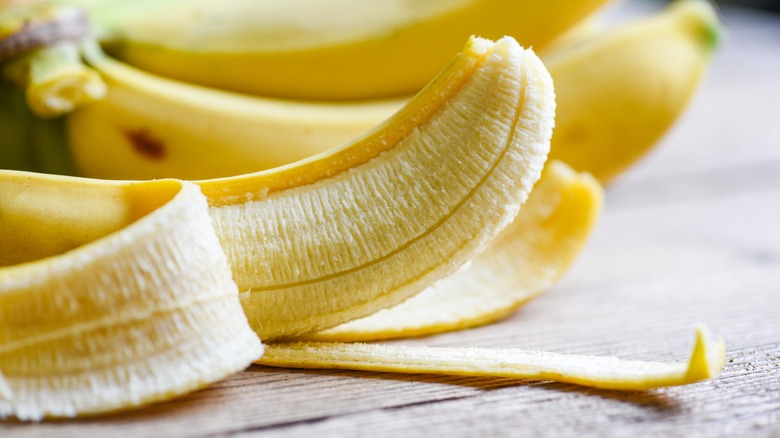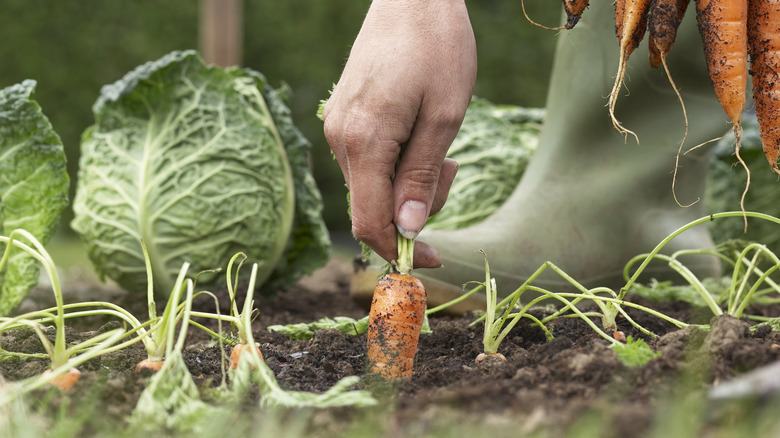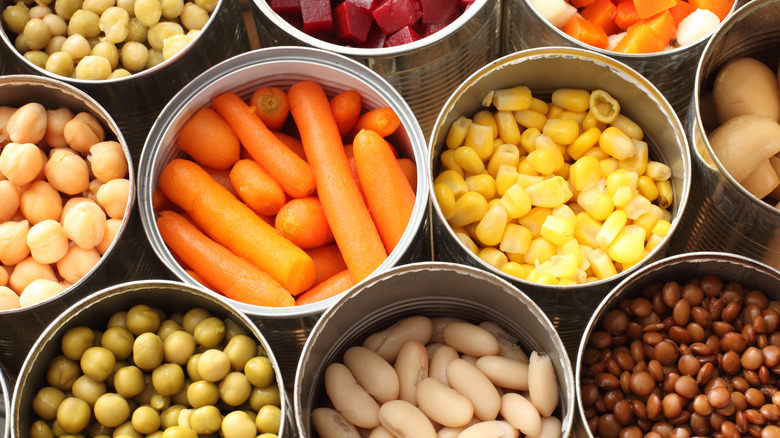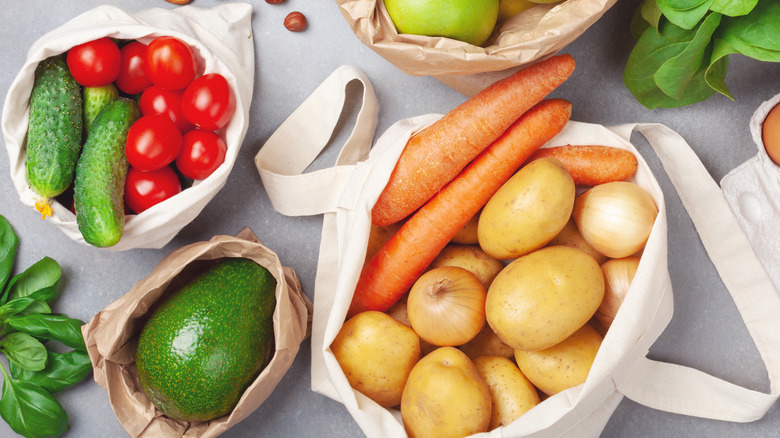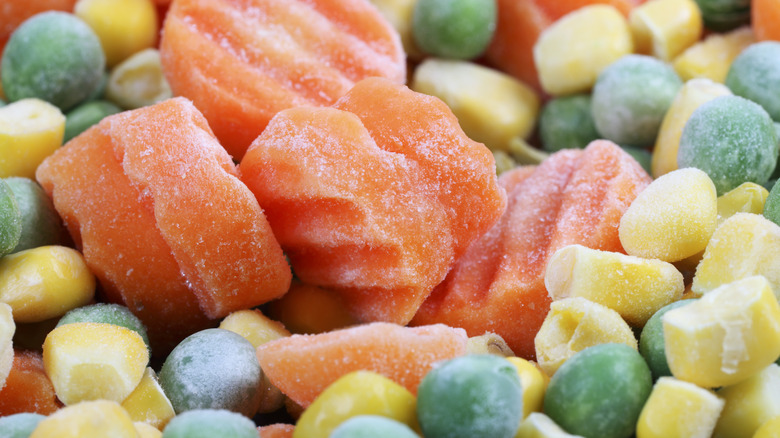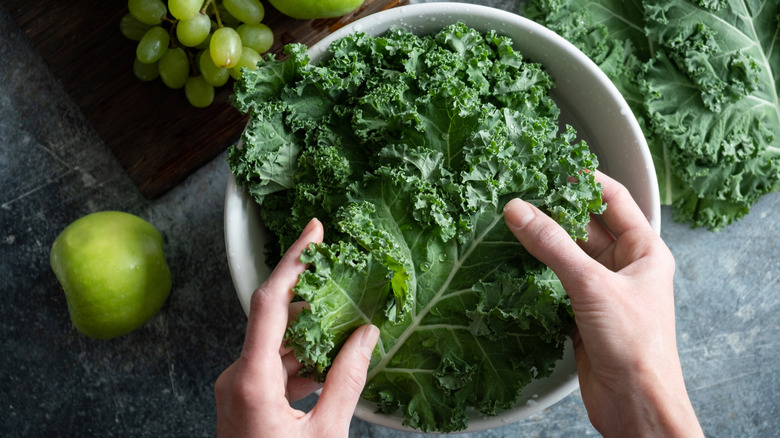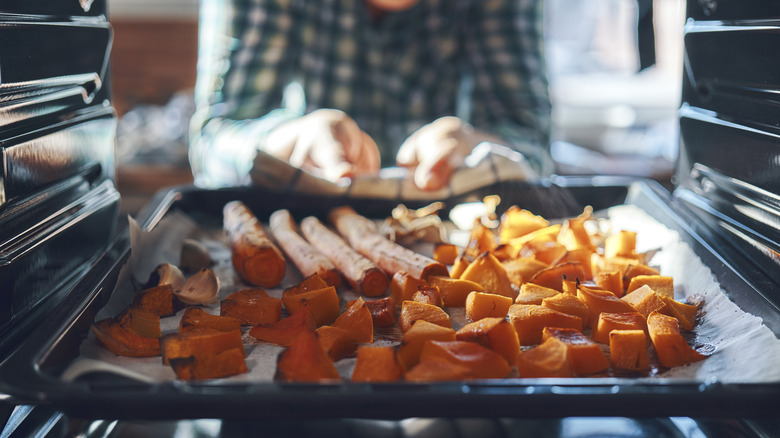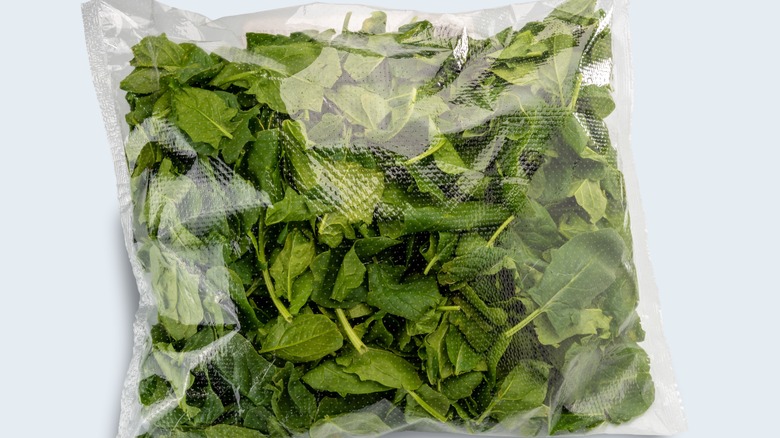14 Myths About Washing Fruits And Vegetables You Should Stop Believing
Our understanding of food safety and hygiene may have come a long way, but foodborne illness still presents a very real risk. A sixth of all Americans get sick every year from foodborne diseases, according to the CDC. These foodborne illnesses can come from almost any direction, with meat, seafood, and eggs all common sources — but fruits and vegetables can unfortunately be pretty troublesome. Fresh, raw fruits and vegetables often carry the microbes that cause nasty diseases like norovirus, the vomiting illness that affects 685 million people worldwide annually and approximately 19-21 million in the United States, as stated by the CDC. Fruits and vegetables can also harbor dirt, germs, and pesticides, all of which you'd probably rather not eat.
As such, the case for washing your fruits and vegetables is pretty clear. But there's also a lot of misinformation out there about just how to do it and a lot of worry about whether you're doing it right or not. We wanted to separate fact from fiction and figure out whether you really do need to wash your fruits and vegetables in a fancy produce wash, the right temperature you should be washing your food at, and if soap or any other cleaning product is really necessary.
1. Myth: Produce wash is safer than regular tap water
It can be tempting to assume that just using water won't be enough to wash your produce, and there are some clever product makers out there who have tapped into this belief. This has resulted in the market being awash with produce cleaning items, which usually come bottled or in spray form, with the promise that they'll completely sanitize your fruits and vegetables. These products generally contain alcohol, acids, and other ingredients that have antimicrobial properties.
But while these might be comforting, they're not necessary. "Running water is just as effective as any veggie washes or vinegar solutions," says Shelley Feist to Better Homes & Gardens. The aim is to get rid of any bacteria or microbes, and running water will wick them directly away from your produce and straight down the sink — they don't need to be killed off using citric acid, vinegar, or the like.
Importantly, though, you need to make sure you're not washing germs off your produce with standing water. "It increases the possibility for contamination," says Feist, who advises that even a seemingly-sanitary sink could have nasty microbes lurking in it.
2. Myth: Washing fruits and vegetables in bleach will make them safer
Bleach is one of the most powerful and common commercially-available disinfectants. And so if you're trying to sanitize foods prone to carrying bacteria, like fruits and vegetables, it can make sense to think it could be useful, especially when there's an uptick in illnesses going around or fears around diseases. During the early days of the COVID-19 pandemic, for example, washing produce with bleach became more common as more and more people sought to make their food safe for consumption.
Unfortunately, not only is doing so unnecessary, but highly unsafe. Bleach is both poisonous and corrosive, and it can cause significant damage to your gastrointestinal tract, according to Healthline. Ingesting it can quickly result in several unpleasant symptoms and cause organ failure or even death. Bleach can be damaging even if you consume a small amount of it, so even using a diluted solution on your food can be harmful. Aside from the dangers, you don't need any in the first place: Running water and a firm brush will be more than adequate to clean your fruits and vegetables.
3. Myth: You should use soap to wash your produce
Logically, it makes sense: You wash your hands with soap to get rid of any germs, so why wouldn't you wash your fruits and vegetables with it, too? The issue, unfortunately, is that you're not meant to eat it. "Soap, in a lot of cases, has a different chemistry than the body should be ingesting," says professor Jason Bolton, per the Washington Post. If you don't completely wash the soap you're using off your produce, or if more porous fruits and vegetables, like green onions and beansprouts, absorb some of it, it can end up irritating your digestive system and causing you some trouble.
As well as this, putting soap on your fruits and vegetables can leave you with a nasty taste in your mouth, quite literally. Soap may smell good, but it can be extremely bitter, and if you leave any on your fruits and vegetables, it'll ruin their taste. But the main reason you shouldn't put soap on your produce is you just don't need to: Water's just fine. "Bottom line from the literature is that rinsing produce is doing something, washing with soap is really not doing anything more, and can only increase risk as soap residue is not intended to be consumed and has led to toxicity/nausea in certain cases," says professor Ben Chapman.
4. Myth: Hot water is better for washing fruit and vegetables
Hot water is generally perceived to be better for cleaning than cold water is, with heated liquids being better-suited to breaking up dirt, thanks to its increased molecular activity. And while in most modern cleaning situations, cold water works just as well, with the motion of dishwashers and washing machines doing most of the work, this has led some people to believe that hot water is better and more sanitary for cleaning fruits and vegetables.
But this isn't quite the case — and it could actually make your produce less safe. "When handling produce, use cold or lukewarm water while washing," says registered dietitian Julie Albrecht, in Best Food Facts. "If the veggie is cold and you use hot water, there is a temperature differential that is set up and water may move into the produce carrying microorganisms with it."
Additionally, the temperature you would have to use to clean fruits and vegetables to ensure that any bacteria was killed would likely be way higher than is comfortable. Bacteria can grow at temperatures between 40 and 140 degrees Fahrenheit. If your water is 140 degrees Fahrenheit, your skin will sustain third-degree burns within six seconds of exposure, with that window shortening to two seconds at 150 degrees. That's not exactly what you want when you're preparing your fruits and veggies.
5. Myth: You have to soak all of your produce to fully clean it
Soaking fruits and vegetables can feel like a more thorough way of getting them spick and span and making sure that the water gets into every corner of the food. It's also a refreshingly hands-off way of cleaning for some folks, freeing you up so you have time to do other prep jobs before coming back to your produce.
However, it's largely unnecessary. Soaking most fruits and vegetables doesn't make them any more sanitary, and if your produce does have bacteria on it, those germs are going to remain in the water that your food is sitting in. For smooth fruits and vegetables, it's enough to run them under a running tap, scrubbing them firmly with your hands or a brush.
Having said this, there are certain fruits and vegetables which do benefit from soaking. Items that are prone to carrying dirt or which have bumpy surfaces or hard-to-reach parts, like broccoli, should be soaked in water for a few minutes to loosen things up. After they soak, though, they should always be rinsed and scrubbed thoroughly in cold running water so that any bacteria or dirt dislodged is fully removed.
6. Myth: You don't have to wash organic fruits and vegetables
There's an implication with organic food items that not only are they more wholesome, but they're somehow cleaner. But while it's definitely true that organic produce is made using way fewer synthetic pesticides and fertilizers, that doesn't mean you shouldn't be cleaning it in the same way. "Organic produce needs to be washed, as it still can have pathogens on it," says the Center for Food Safety's senior policy analyst Jaydee Hansen, in Organic Authority. Although a lot of chemicals are off the table in organic farming practices, some are still approved and used, meaning that even your organic foods may not be totally substance-free.
As well as this, fruits and vegetables can also pick up contaminants on their way from the farm to your table. You also can't necessarily account for where the food you're about to eat is grown, with pesticide spray drift being an issue for farms that neighbor growing areas that use non-organic methods. And organic fruits and vegetables can still carry dirt that you'd probably rather not be eating. Cleaning your produce is the best way to reduce the potential impact of all of these.
7. Myth: If you're peeling your fruits and vegetables, you don't need to wash them
When you peel fruits and vegetables, you're removing the top layer of their skin, where any pesticides, bacteria, or dirt are likely to be sitting. So is it really that necessary to clean them before you do so? It certainly is, but if you peel a piece of food without washing it first, any of the potential germs on it will transfer both to your hand and to your peeling device. Once there, they can then be transferred to other food items, surfaces, or to your face the next time you touch it absent-mindedly.
As such, make sure that washing your fruits and vegetables is the first job you do, followed by washing your hands before you pick up your peeler. You should also do this with produce that you peel with your hands, like bananas or oranges. This rule also applies if you're preparing fruits and vegetables by cutting them open, scooping their insides out, or chunking them up, like pineapple, melon, or avocado. With these items, bacteria can also transfer to your cutting board or your knife, creating multiple hazard zones.
8. Myth: Fruits and vegetables grown in your garden don't need washing
There are few things as cozy or satisfying as eating fruits and vegetables that you've grown yourself. But unless you wash it before it reaches your table, you might be left feeling a little worse for wear. Fungi, bacteria, and other potential contaminants can all affect your homegrown produce. These can make your food hazardous to eat unless they're washed off thoroughly before preparation.
It's also important to note that chemicals can still make their way onto your fruits and vegetables in your garden via cross-contamination. If you've used any gardening chemicals in another area of your backyard, these have the potential of making their way over to your produce, either via a strong breeze or through human or animal contact. And as homegrown fruits and vegetables don't have the same cleaning processes that commercially-grown produce do, they're far more likely to be carrying dirt in their nooks and crannies that will need washing away before you can enjoy it. Washing your produce will also help to give you peace of mind if you've seen a bug lurking on your tomatoes or cucumbers, although it's important to remember that some of these insects, particularly spiders, can actually be beneficial for your garden plants and their health.
9. Myth: Washing canned vegetables is pointless
Canned vegetables represent the ultimate in convenience and are a great way to get something green on the table without having to go to the store to buy fresh produce. But while they're technically ready to be used straight out of the tin, they should always be rinsed first. Canned vegetables can be very high in sodium, thanks to the brine they're often packed in. Some innocent — and healthy-looking options like canned peas can have a significant portion of your daily value of sodium in just a half-cup serving.
Washing canned vegetables before you eat them, therefore, can help to bring your sodium intake down. It can also help to get rid of any added sugars or other additives or preservatives that might have been added to the brine. Rinsing canned vegetables can also help to remove any unwanted gunk from the items, which some canned items like chickpeas can be prone to developing. Remember, though, you don't have to throw out the liquid from the can. Soaking solutions like chickpea water, also known as aquafaba, can be used in unique and exciting ways, particularly as a vegan egg white substitute.
10. Myth: You should wash fruits and vegetables the moment you get them home
Getting your produce clean as soon as you walk in the door can feel like a smart move for two reasons. The first is that you're cleaning off any pathogens or microbes that have lingered from the store, preventing them from contaminating any other food items, and the second is that it's pretty satisfying to just get the job done straight away, so you don't have to worry about it when you come to cook.
But you should actually hold off on cleaning your fruits and vegetables until you're ready to eat them. If you wash produce and then place it back into your store cupboard or fruit bowl, you're simply giving it more time to collect germs or grow any bacteria. Those pieces of fruit or those vegetables could also easily pick up microbes from another part of your kitchen, rendering the whole endeavor pointless.
To add to this, by washing fruits and vegetables and then storing them, you might be inadvertently making them more likely to grow bacteria, especially if you leave them moist, which helps microbes thrive. Cleaning your produce just before you eat it, on the other hand, ensures that it's the most sanitary it can be and gives you peace of mind that nothing else has contaminated it.
11. Myth: Frozen fruits and vegetables never need to be washed
Store-bought frozen fruits and vegetables taste pretty fresh when they get to your table, but they undergo a certain amount of processing before they're bagged. Oftentimes, this process will involve them being washed and then blanched, which helps to remove any pathogens and ready them for freezing.
That doesn't mean that they're immune to growing bacteria forever, however — and whether you wash your frozen fruits or vegetables depends largely on what the package says and how you treat them before cooking. Most frozen produce will be good to go straight from the pack, but if the package instructs that you should wash or rinse them before cooking, then follow that directive to the letter. Additionally, frozen vegetables can be more susceptible to bacterial growth than frozen fruits, so you're more likely to have to wash them.
It's also crucial to note that just because frozen fruits and vegetables may be clean and microbe-free when they're in your freezer, that doesn't mean they'll stay that way forever. If you defrost frozen produce and then leave it out for a certain period, it can begin to grow bacteria just like anything else. Any food that you've frozen yourself, too, or frozen produce that hasn't been produced in a factory, may not have been through the same cleaning standards.
12. Myth: It's enough to just run fruits and vegetables under the tap
Washing fruits and vegetables takes a little bit of work. And while it's definitely true that you don't necessarily need more than cold running water for liquid, it's also a good idea to grab yourself a cleaning utensil like a stiff-bristled brush. Not only will a brush help to rid your food of potential microbes more thoroughly, but it's also the best way to dislodge any stubborn soil that's made its way into your produce.
Importantly, a stiff-bristled brush won't be the best option for all types of fruits and vegetables. With more delicate items like lettuce, leafy greens, or berries, you should use your hands or a soft cloth to get rid of any dirt. For harder-to-reach dirt, a new toothbrush is your best friend, as the small head will give it access to places that a larger brush may not be able to reach. Always follow up on any scrubbing you do with a further rinse, and remember to rinse your brush periodically, too. If it gets dirt stuck in it, you'll just end up rubbing it back into your fruits or vegetables, creating even more mess.
13. Myth: If you're going to cook fruits or vegetables, you don't need to wash them
Washing fruits and vegetables can feel somewhat pointless if you're just going to throw them in a pan of boiling water afterward, thereby eliminating any bacteria or pathogens with the high heat. But microbes aren't the only thing you should be worried about. Washing your produce removes pesticides in a way that simply cooking them may not. While applying high heat to pesticides does reduce them significantly, it may not get rid of them completely. Your best line of defense, therefore, is to wash your fruits and vegetables thoroughly.
Furthermore, cooking fruits and vegetables without washing them may mean that you're leaving any dirt that's been carried with them from the farm still attached. While boiling or steaming vegetables may dislodge the dirt somewhat, there's no guarantee it'll be removed entirely — and if you're using dry heat to cook your produce by frying or roasting it, it's likely going nowhere. This not only increases your risk of picking up something unwanted from your food, but it also means that you might end up with a gritty-tasting end product.
14. Myth: Pre-washed fruits and vegetables still need rinsing
Pre-washed produce is super convenient, but it's also something that some people don't entirely trust. And given that items like bagged salad can frequently become slimy and unappetizing, it can be assumed sometimes that they're actually not as sanitary as they say they are.
The truth, though, is that if your fruits and vegetables are marketed as pre-washed, you really don't need to wash them again. Firstly, these items are washed thoroughly and bagged in sanitary commercial conditions, with a rigorous process called a commercial triple-wash undertaken to ensure that they're as clean as can be. While there's always the risk that items can still be dangerous after this washing procedure, it's unlikely that your at-home wash will do a better job. "These washes at home may not be sufficient to render the food safety; if it had been contaminated," stresses food science professor Alex Castillo, per Inverse. If that food is destined to make you sick, no amount of washing will prevent it.
Secondly, by washing your pre-washed produce when you get it home, you run the risk of contaminating it in your own kitchen, making an already-sanitary product into something unsafe. This risk is increased if you wash it and then leave it a while before cooking or using it. It's far better to just use your pre-washed items straight from their packaging, using clean hands to handle them.
